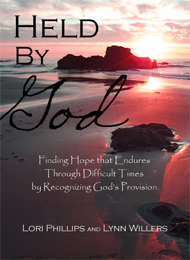Life frequently has a way of not working out exactly how we envisioned. Unexpected situations occur that leave our world in pieces–the loss of a beloved family member, sickness or injury, the loss of a job or home, betrayal by a spouse. These losses can leave us feeling abused, rejected, abandoned or forgotten. The Bible is full of people who, despite their faith in God, found themselves in situations that seemed hard to overcome. Joseph was sold into slavery by his jealous brothers. David was forced to run for his life. Job lost his children and then his health. From their perspectives, life had certainly taken a wrong turn somewhere. Their deep feelings about their situations brought forth heavy questions–questions for God. Similar situations bring out the same emotions in us today. While God often does not tell us why we are suffering, he does give us examples from his Word, to help us through the times when we do suffer.
King David was no stranger to turmoil. Although powerful and wealthy, parts of his life were filled with loss, guilt, and fear. The Psalms record many of these feelings when he cried out to the Lord in pain or confusion. Several chapters are devoted to his dismay about the loss of control over his own life. During one of his “the-world-is-going-to-hell-in-a-hand-basket” prayers, he penned his feelings of anxiety.
“When the foundations are being destroyed, what can the righteous do?” (Ps. 11:3).
Clearly upset with his world falling apart around him, he expresses the same feelings of helplessness that many of us experience today when we face similar circumstances. However, in the next verse he does not answer the question with a laundry list of all the things a person could do to alleviate his anxiety. Instead, he makes two statements about God. He tells us where God is and what God is doing.
The LORD is in his holy temple; the LORD is on his heavenly throne. He observes the sons of men; his eyes examine them (Ps. 11:4).
God is in heaven and he is on his throne. That would imply that he is sitting. The second part of that verse says that he is also watching. So he is sitting and he’s watching. Notice it does not say that he is pacing before his throne or running to and fro, wringing his hands and wondering what he should do about us and about the problems that afflict us. We might ask, “Well why not? That’s what we’re doing! We have problems and we are worried about them!” Like David, on occasion we can become very exasperated with our circumstances; but not God. He is immovable, steadfast, and unflustered. Why is it that he can be so calm while we frantically need something to be done about our situation? We might see two possible reasons. The first is that he is indifferent to our suffering. That does not seem likely since he has gone to such great lengths to tell us about the magnitude of his love for us.
But because of his great love for us, God, who is rich in mercy, made us alive with Christ even when we were dead in transgressions – it is by grace you have been saved (Eph. 2:4-5).
And we know that in all things God works for the good of those who love him, who have been called according to his purpose (Rom. 8:28).
From these two verses alone, it is obvious that he is not indifferent. The second possibility is that he knows he has the situation under control and is assured of the outcome.
“For I know the plans I have for you,” declares the LORD, “plans to prosper you and not to harm you, plans to give you hope and a future” (Jer. 29:11).
Herein we see the answer to David’s question. If God loves us, works everything together for our good, and is assured that his plan is perfect then our peace comes from knowing that we can do nothing and he can do everything. He is all powerful and knows every detail of our lives. He is watching and working behind the scenes in ways that we cannot imagine.
“For my thoughts are not your thoughts, neither are your ways my ways,” declares the LORD. “As the heavens are higher than the earth, so are my ways higher than your ways and my thoughts than your thoughts” (Isa. 55:8-9).
His ways, his thoughts, and his plans are much more complicated than we could ever comprehend. When we grasp this concept and understand that God is not prone to hand-wringing or polling others before making decision, then we can rest in the knowledge that he knows how to take care of us, just as children trust their parents to take care of them. While children remain oblivious to the details, their parents carefully coordinate meals, education, transportation, immunizations, new school clothes, baseball practice, drill team uniforms–the list goes on. The same is true for our relationship with God. We don’t need to know everything he knows, we just need know that he will take care of us regardless of our circumstances. Then we can rest in him during our times of suffering, and watch, as he uses the bad to bring about the good.
(Some parts of this post are excerpts from Held by God)
On the journey toward Home,












